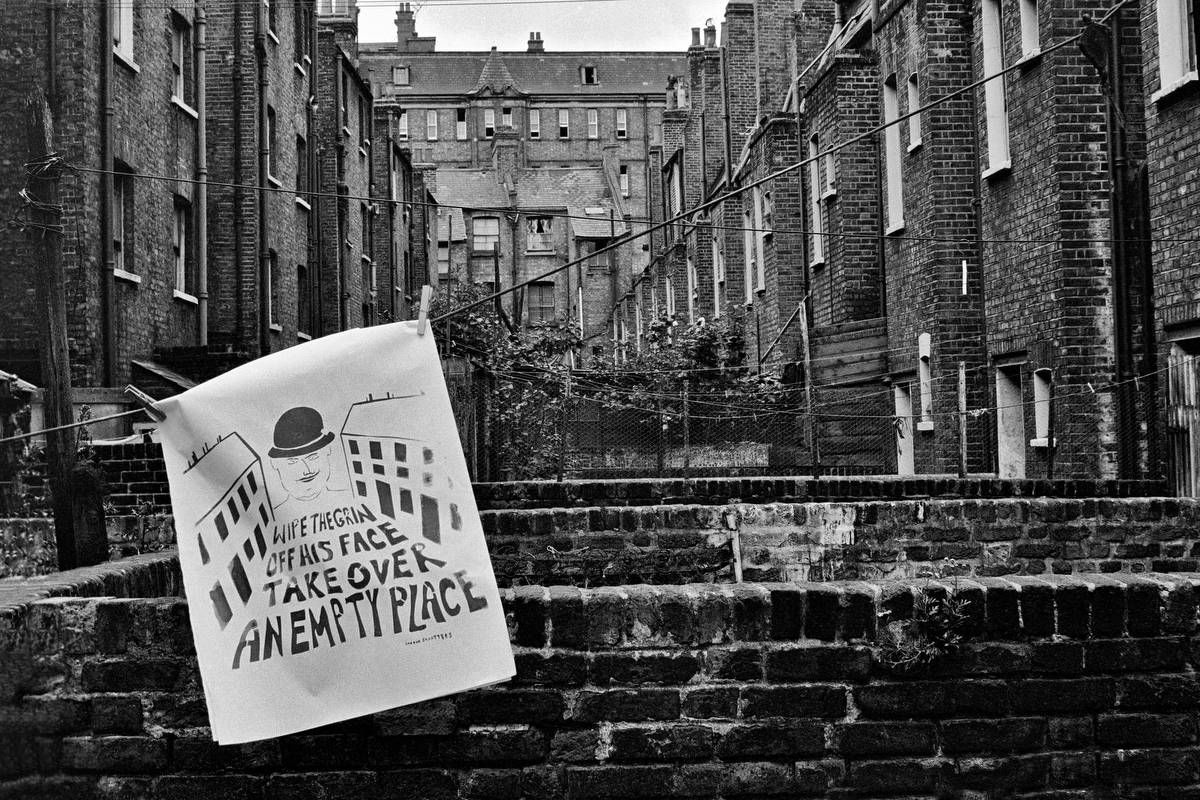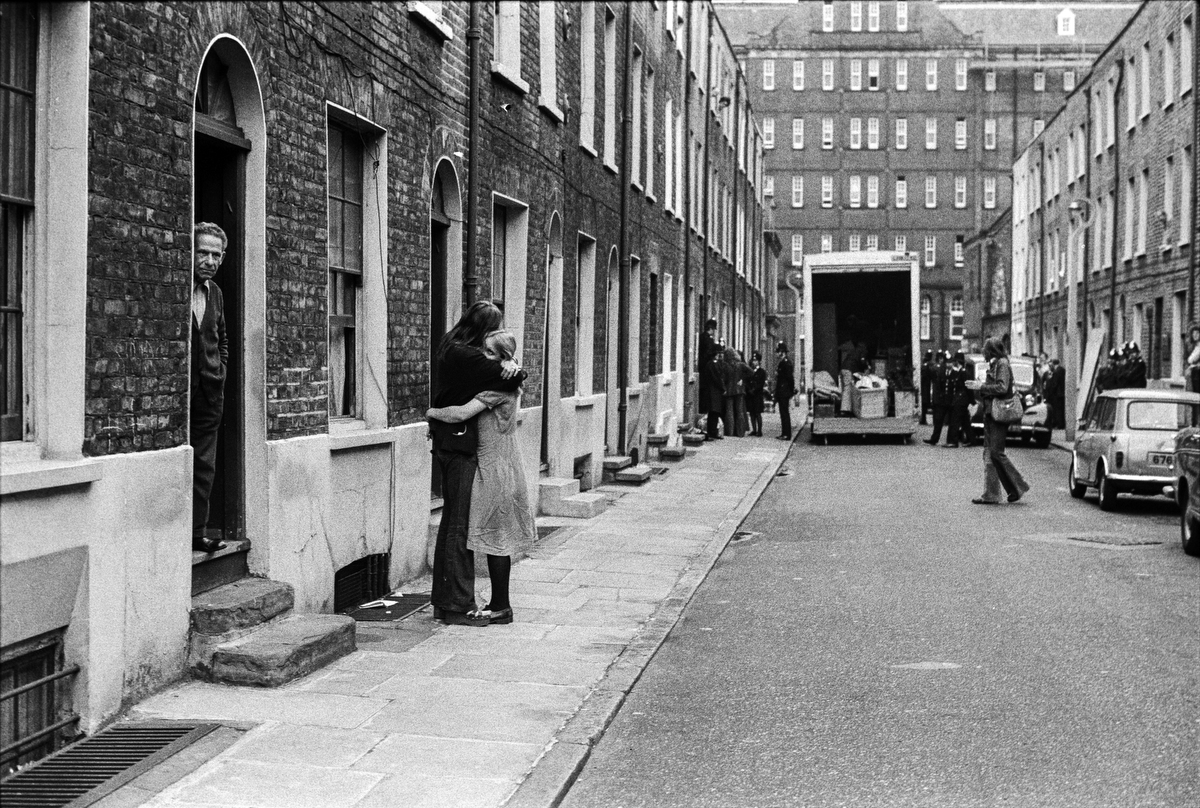The London squatters who resisted evictions in the ‘70s
- Text by Miss Rosen
- Photography by David Hoffman

While living in York in his late teens, British photographer David Hoffman did odd jobs to survive (“some more nefarious than others,” he admits). He began selling pictures to the Yorkshire Evening Post. The paper had no interest in publishing stories on the horrific living conditions of the working class, so Hoffman resolved that this was something he had to pursue for himself.
In the early 1970s, Hoffman arrived in Whitechapel in London’s East End. “It was filthy and felt abandoned,” he remembers. “Much of the housing was semi-derelict and many of the shops were on their last legs. For many it was the place where they ended up when their lives fell apart. It was clearly a dead end.”

Squatters waiting to resist eviction behind the barricaded front door of a squat, Parfett Street, 1973
Many lived in squats to escape homelessness. “Squatting is mostly a communal activity,” Hoffman says. “It brings people together to repair and improve the, mostly broken-down, housing available. The mutual support – and mutual tensions – helped form political understanding and brought us together in activist groups.”
Hoffman found it shameful that the City of London, located just one mile away, offered no support. “While I was powerless to change any of it, I felt that I could and should at least document it,” says Hoffman.
Under the banner of slum clearance and “urban renewal,” the city council decided to tear down the crumbling buildings where squatters lived, with landlords forcing evictions. With the release of Parfett St Evictions 1973 (Café Royal), Hoffman revisits what became the first British protest photography book when it was first published in 1976.

Waiting for the bailiffs before the eviction of squatters, Parfett Street, 1973

One of many posters around the East End protesting at the eviction of squatters, Parfett Street, 1973
Like many squats the one in Parfett Street housed a wide range of people. “Doris Lerner was the oldest and had been a political activist all her life. Doris would go to auctions of squatted houses and buy them. Being penniless this would delay the sale and extend the life of the squat,” Hoffman says.
“Tony was an early and resolute Gay Rights activist. Duncan was an anarchist and believer in redistribution. Bonkers Piers Corbyn, brother of Jeremy Corbyn would turn up occasionally, try and steal some limelight and then wander off when there was work to be done. We had sex workers, architects, performers, jewellers, musical instrument makers and drug dealers. A healthy mix.”

March on Tower Hamlets Town Hall in Patriot Square protesting against the eviction of squatters, Parfett Street, 1973
Police would regularly harass people around the squats who looked “different,” often stopping and searching them for drugs in the hopes of an easy arrest. “They’d turn up to protect bailiffs in an eviction but they didn’t bother to patrol the area much and generally saw anything to do with us as rubbish work, beneath their dignity,” Hoffman says. “When landlords sent in heavies to make an unlawful eviction, the police were nowhere to be seen.”
Nearly 40 years since these photographs were made, and the lessons they offer are timeless. “We cannot expect the state or those with power to do anything meaningful to alleviate social ills,” Hoffman says. “Banding together is our only route to social justice. If you need a home, take one.”

Police try (and fail) to force a path through squatters and their supporters, Parfett Street, 1973

Fieldgate Mansions, a 19th century tenement block due to be demolished in 1972 but preserved by squatters occupying it

Council official tells squatters who had marched on Tower Hamlets Town Hall that they should go away. Patriot Square, 1973

Fieldgate Mansions, Whitechapel Summer 1985. Scheduled for demolition in 1972 it was squatted by homeless people, artists & Bengali immigrants preventing destruction

Empty house graffitied following the eviction of squatters, Whitechapel, 1973

Eviction of squatters from private rented property that was being kept empty in Parfett Street, 1973
Parfett St Evictions 1973 is out now on Café Royal Books.
Enjoyed this article? Like Huck on Facebook or follow us on Twitter.
Latest on Huck

Bernie Sanders introduces Clairo at Coachella, urging young Americans to “stand up for justice”
Coachella charmed — The Vermont Senator praised the singer-songwriter for her efforts in raising awareness of women’s rights issues and Gaza.
Written by: Isaac Muk

The Changing Face Of Brooklyn, New York’s Most Colourful Borough
After three decades spent capturing stories around the world, Magnum Photographer Alex Webb finally decided to return home to Brooklyn – a place that champions chaos, diversity and community spirit.
Written by: Alex Webb / Magnum Photos

The mundane bliss of New York’s subways in the ’70s
NYC Passengers 1976-1981 — During a very different decade in NYC, which bounced between rich creativity and sketchiness, photographer Joni Sternbach captured the idiosyncratic isolation found on its rail networks.
Written by: Miss Rosen

Analogue Appreciation: lullahush
Ithaca — In an ever more digital, online world, we ask our favourite artists about their most cherished pieces of physical culture. Today, it’s Irish retro-futurist lullahush.
Written by: lullahush

Spyros Rennt captures connection and tenderness among Berlin’s queer youth
Intertwined — In the Greek photographer’s fourth photobook, he lays out spreads of togetherness among his friends and the German capital’s LGBTQ+ party scene.
Written by: Isaac Muk

The rebellious roots of Cornwall’s surfing scene
100 years of waveriding — Despite past attempts to ban the sport from beaches, surfers have remained as integral, conservationist presences in England’s southwestern tip. A new exhibition in Falmouth traces its long history in the area.
Written by: Ella Glossop